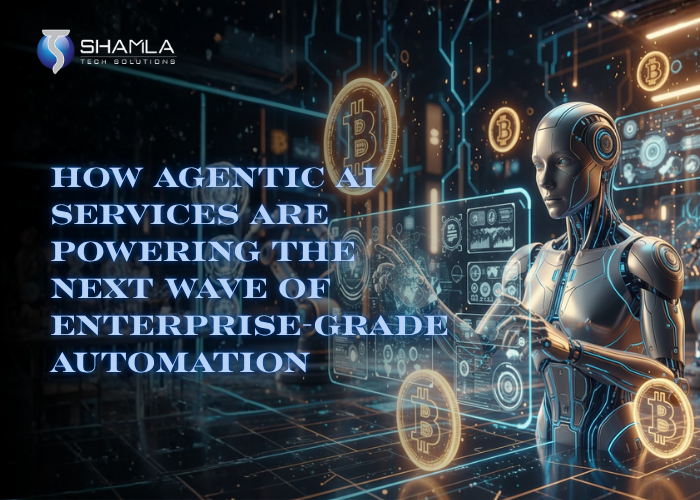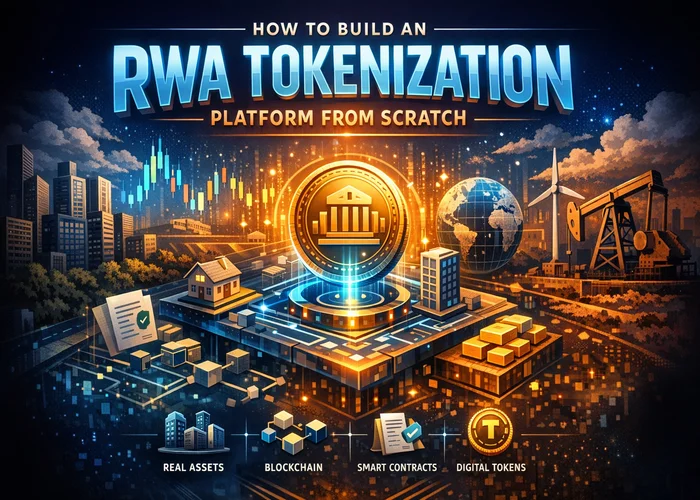What is Agentic AI?
Why Agentic AI Services Matter for Enterprise Automation
From Reactive to Proactive Automation
Traditional automation relies on pre-programmed rules — “if this, then that.” In contrast, Agentic AI services introduce autonomous AI agents that:
- Anticipate potential challenges and adapt responses dynamically.
- Analyze real-time data to make predictive decisions.
- Plan and execute actions proactively instead of waiting for human prompts.
This proactive automation empowers enterprises to stay ahead of disruptions, improve decision accuracy, and maintain operational resilience.
Handling Complex, Multi-Step Enterprise Workflows
Most enterprise processes span multiple departments and technologies. Agentic AI services enable seamless orchestration through enterprise agentic AI workflows, where multiple agents work collaboratively to:
- Integrate data and actions across ERP, CRM, HR, and supply chain systems.
- Manage approvals, escalations, and dependencies autonomously.
- Ensure compliance and accuracy across distributed teams.
By embedding autonomous AI agents, businesses achieve end-to-end automation that scales intelligently and executes with minimal supervision.
Scalability, Adaptability, and Continuous Learning
When you invest in Agentic AI development, you’re not just building a static automation system — you’re creating a self-evolving network. With every cycle of data and decision:
- Agents refine their algorithms through continuous feedback loops.
- The system learns and improves across departments and geographies.
- Workflows evolve dynamically to match changing business needs.
This adaptability ensures that Agentic AI services grow stronger and smarter as the enterprise scales.
Integration into Core Enterprise Systems
Unlike traditional automation that operates in silos, Agentic AI services are deeply integrated into enterprise cores — unifying systems like:
- Finance (for predictive budgeting and fraud detection)
- HR (for talent forecasting and workload optimization)
- Customer Service (for intelligent support and response routing)
- Supply Chain (for demand prediction and logistics automation)
This seamless integration ensures automation isn’t just peripheral but central to enterprise intelligence.
Accelerated ROI and Operational Efficiency
Agentic AI development directly contributes to improved ROI by:
- Reducing manual dependencies and human errors.
- Enhancing operational speed by automating multi-step processes.
- Enabling continuous improvement through self-learning feedback loops.
Enterprises implementing Agentic AI services often see process acceleration by 30–50%, improved accuracy, and substantial cost savings.
Building a Collaborative AI Ecosystem
A skilled AI agent development company can architect a multi-agent ecosystem where each autonomous AI agent specializes in a function (finance, HR, IT, logistics) while communicating seamlessly with others. This enables:
- Distributed intelligence across departments.
- Collaborative task execution with minimal human oversight.
- Holistic automation where agents learn from one another’s outcomes.
Such architectures lay the foundation for self-governing, enterprise-grade automation ecosystems.
Governance, Transparency, and Compliance
In Summary
Agentic AI vs Generative AI vs Traditional AI
| Aspect | Traditional AI | Generative AI | Agentic AI |
| Core Capability | Executes pre-programmed tasks using structured data. | Generates new content (text, code, images, etc.) using models like GPT or diffusion. | Acts autonomously — perceives, reasons, and takes actions through autonomous AI agents. |
| Primary Function | Automation of repetitive or rule-based processes. | Creative generation and ideation support. | Intelligent decision-making and adaptive enterprise automation. |
| Data Dependency | Relies on historical and labeled data. | Uses massive unstructured datasets for training. | Uses real-time enterprise data across systems (ERP, CRM, HR, etc.). |
| Autonomy Level | Minimal — requires constant human supervision. | Moderate — creates outputs based on prompts. | High — agents self-govern, plan, and execute tasks via enterprise agentic AI workflows. |
| Learning Type | Static machine learning models. | Pattern recognition and generative modeling. | Continuous reinforcement learning through Agentic AI development. |
Integration Scope | Limited integration into enterprise systems. | Integrates into creative or data-driven platforms. | Deep integration into enterprise backbones via Agentic AI services. |
Collaboration | Works in silos. | Supports human collaboration in creative tasks. | Multi-agent collaboration forming a digital workforce. |
Outcome Type | Outputs insights or predictions. | Produces new creative assets or content. | Delivers measurable business results — automating full workflows. |
Use Case Example | Predictive analytics, fraud detection. | Content generation, chatbot responses, design automation. | Intelligent workflow orchestration, supply chain optimization, adaptive enterprise processes. |
Human Role | Heavy supervision required. | Prompt-based assistance. | Strategic oversight only — agents operate autonomously. |
The Anatomy of Enterprise Agentic AI Workflow
Component | Function in the Workflow | Role in Enterprise Automation |
Perception Layer | Collects structured and unstructured data from internal systems (ERP, CRM, HR, IoT) and external sources (APIs, sensors, web). | Provides context and situational awareness for each autonomous AI agent. |
Cognitive Layer | Applies AI models such as NLP, ML, and reasoning algorithms to interpret and infer meaning from the data. | Converts raw data into actionable, human-like understanding for smart decisions. |
Decision Layer | Uses goal-oriented logic and reinforcement learning to evaluate multiple outcomes and select the optimal one. | Enables Agentic AI services to make adaptive, data-driven decisions autonomously. |
Orchestration Layer | Coordinates actions among multiple autonomous AI agents working across departments and systems. | Ensures smooth collaboration and synchronization in the enterprise agentic AI workflow. |
Execution Layer | Executes chosen actions through system APIs, RPA bots, and enterprise process engines. | Turns AI-generated decisions into measurable business outcomes. |
Learning Layer | Captures feedback, retrains models, and enhances performance over time. | Drives continuous improvement and operational scalability. |
Governance Layer | Defines policies, compliance, and explainability protocols for AI behavior and decisions. | Ensures ethical, transparent, and compliant Agentic AI development within enterprise boundaries. |
Security & Trust Layer | Protects sensitive enterprise data, validates agent integrity, and manages identity and permissions. | Builds enterprise-grade resilience and trust in Agentic AI services. |
Real-World Use Cases of Agentic AI Services in Enterprise Automation
Supply Chain & Logistics Optimization
Agent Function | How Agentic AI Services Apply | Outcome in Enterprise Automation |
Inventory Agent | Monitors stock levels and triggers restocking autonomously. | Reduces shortages and overstocking. |
Routing Agent | Detects shipment delays and dynamically reroutes deliveries. | Minimizes downtime and delays. |
Forecasting Agent | Uses historical data and real-time insights for demand prediction. | Improves planning accuracy. |
Customer Support & Self-Service Intelligence
- Multi-step support tickets resolved autonomously.
- Context-aware escalation to human agents only when necessary.
- Integration with CRM (Salesforce, HubSpot) for personalized responses.
- Self-learning feedback loop improves accuracy with every case.
These Agentic AI development frameworks enable AI-powered customer desks that handle thousands of interactions — with human-like empathy and machine-level precision.
HR & Employee Lifecycle Automation
Agentic AI services extend deep into workforce management — handling workflows from recruitment to retention. Autonomous AI agents eliminate manual bottlenecks in HR processes.
Use Case: AI-Driven HR Automation
- Onboarding Agents – Automate paperwork, asset allocation, and orientation.
- Employee Services Agents – Handle travel, leave, and benefits requests autonomously.
- Engagement Agents – Analyze sentiment and retention trends.
By integrating Agentic AI services into HR platforms, enterprises move closer to zero-touch operations.
Finance & Risk Management
With Agentic AI development, financial departments deploy agents that act as autonomous auditors — continuously monitoring transactions, compliance, and risks.
Use Case: Intelligent Financial Governance
- Fraud detection via anomaly detection agents.
- Real-time expense categorization and approval.
- Regulatory compliance validation.
- Dynamic risk scoring across business units.
Such enterprise agentic AI workflows enhance accuracy, reduce fraud, and deliver decision intelligence to CFO dashboards.
Software Development & DevOps Automation
Agent Role | Core Function | Impact |
Build Agent | Automates build, test, and deploy cycles. | Speeds up release management. |
Performance Agent | Monitors latency, logs, and metrics. | Predicts and prevents downtime. |
Remediation Agent | Initiates corrective actions autonomously. | Increases reliability and uptime. |
Healthcare Operations & Patient Management
- Clinical Agents – Assist in diagnosis recommendations using EHR data.
- Scheduling Agents – Manage doctor availability and appointment optimization.
- Billing Agents – Automate claims, coding, and audit tracking.
Monitoring Agents – Track patient vitals and trigger early alerts.
Insurance Claims & Policy Automation
Use Case: Smart Insurance Ecosystem
- Claims Agents – Validate and process claims automatically.
- Fraud Agents – Detect anomalies using behavioral analytics.
- Policy Agents – Auto-renew and personalize coverage options.
Outcome: Faster claims cycle, reduced fraud, and higher customer retention through intelligent policy management.
Manufacturing & Predictive Maintenance
Manufacturers are deploying autonomous AI agents to monitor production lines, forecast failures, and optimize output — a core application of Agentic AI development.
Use Case: Smart Factory Automation
- Maintenance Agents – Predict equipment failure and trigger repairs.
- Quality Agents – Ensure product consistency through visual inspection.
- Scheduling Agents – Optimize factory throughput.
Outcome: Increased uptime, reduced waste, and adaptive production scheduling for Industry 4.0 environments.
Retail & E-commerce Intelligence
Agentic AI services empower retail ecosystems with demand prediction, personalized recommendations, and autonomous marketing.
Use Case: Retail Intelligence Network
- Pricing Agents – Adjust prices dynamically based on demand.
- Inventory Agents – Automate reordering and fulfillment.
- Customer Experience Agents – Deliver personalized offers and assistance.
Outcome: Better customer engagement, optimized inventory turnover, and data-driven retail growth.
Energy & Utilities Optimization
Energy and utility companies use Agentic AI services to balance supply-demand dynamics and maintain sustainability goals.
Use Case: Smart Grid Management
- Load Agents – Forecast consumption patterns.
- Distribution Agents – Optimize grid routing.
- Sustainability Agents – Track and adjust for carbon neutrality.
Outcome: Efficient grid operations, energy savings, and intelligent sustainability management.
Across every industry, Agentic AI services are transforming enterprise operations — from autonomous AI agents in logistics and HR to predictive agents in finance and healthcare. By engaging an expert AI agent development company, organizations can build robust enterprise agentic AI workflows that evolve continuously — unlocking unprecedented levels of enterprise automation, resilience, and profitability.
Key Benefits of Agentic AI Services for Enterprise Automation
End-to-End Automation
Less Manual Work
Faster Deployment and Easy Scaling
Continuous Learning and Adaptation
Smarter Decisions
Strong Governance and Security
Challenges & Considerations with Agentic AI Development
- Governance and trust: If agents act autonomously, enterprises need clear frameworks for oversight, accountability and risk.
- Data quality and integration: Agents require high-quality, real-time data from across systems.
- Cultural & process change: Shifting from manual workflows to autonomous agents requires change management.
- Scalability & complexity: Multi-agent systems are complex; this is why Agentic AI development should be planned carefully.
- Clarify business value & ROI: Enterprises must tie Agentic AI services to measurable outcomes to justify investment.
Final Thoughts
How Shamla Tech Helps with Agentic AI Development
- Custom Agentic AI Development: We build intelligent agents tailored to your enterprise workflows — from HR and finance to logistics and customer support.
- Integration with Enterprise Systems: Our AI agents seamlessly connect with ERP, CRM, and legacy systems for unified automation.
- Autonomous Decision-Making: We develop agents capable of contextual reasoning and self-learning for higher accuracy.
- Continuous Learning Frameworks: Our models evolve with your business data, ensuring adaptability and long-term ROI.
- Enterprise Automation Consulting: We help design, deploy, and scale Agentic AI services aligned with your organizational goals.
Why Choose Shamla Tech?
As a trusted AI agent development company, Shamla Tech focuses on delivering measurable outcomes. Our team ensures every Agentic AI service we build enhances productivity, reduces manual workload, and improves operational visibility — all while maintaining transparency and compliance.
At Shamla Tech, we don’t just create AI systems; we build intelligent ecosystems that drive enterprise growth. With our Agentic AI development expertise, we help your business transition from automation to true autonomy — one intelligent agent at a time.
FAQs
What is Agentic AI?
How are Agentic AI services different from traditional AI solutions?
What industries benefit the most from Agentic AI development?
- Finance: Automated risk management and compliance.
- Healthcare: Intelligent patient monitoring and diagnosis support.
- Logistics: Real-time route optimization and supply chain visibility.
- Customer Service: Context-aware chat agents and self-learning help desks.
- HR & Operations: Employee lifecycle management and predictive analytics.
- Insurance: Instant claims processing and personalized policy recommendations.
- Manufacturing: Predictive maintenance and intelligent production scheduling.
- Retail & eCommerce: Dynamic pricing, recommendation engines, and stock automation.
- Energy & Utilities: Smart grid optimization and predictive equipment insights.
- Education: Personalized learning assistants and automated course management.
- Real Estate: AI-powered property valuation and tenant lifecycle automation.
How does an AI agent development company like Shamla Tech help?
What is an enterprise agentic AI workflow?
Are Agentic AI services secure and compliant?
How long does it take to implement Agentic AI in an enterprise?
Can Agentic AI work with existing enterprise automation tools?
What’s the ROI of adopting Agentic AI services?
- Up to 50–70% reduction in manual tasks.
- Real-time decision-making improvements.
- Increased operational efficiency and scalability.
- Enhanced business agility with autonomous processes.








